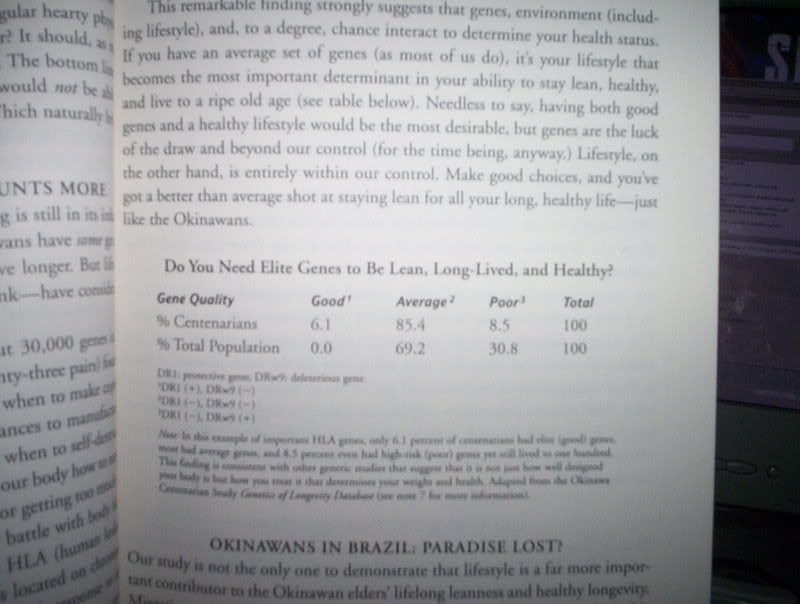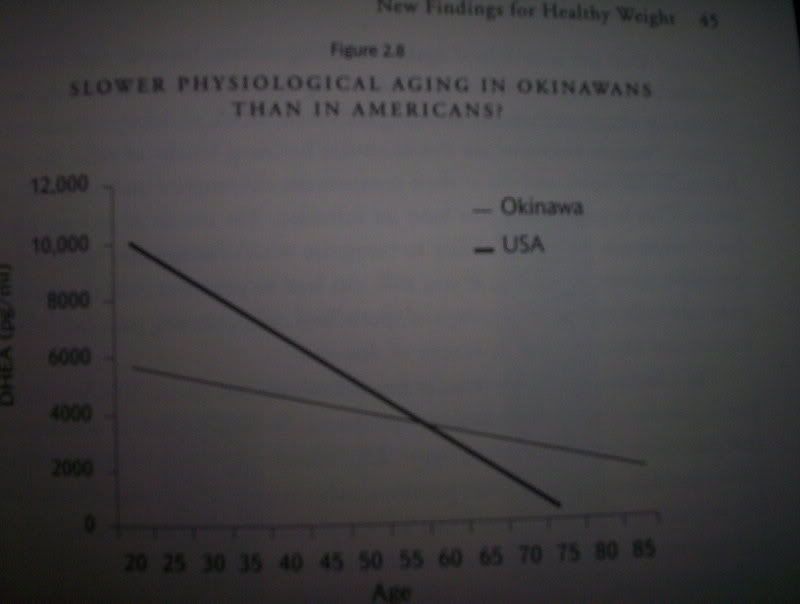DNA of active centenarians (video of 112 y...
 Matt
23 Dec 2006
Matt
23 Dec 2006
_dna_active_supercen/
http://tinyurl.com/ylhjcu
Wow. she's 112 and looks literally decades younger.
Check out the video :-)
Matt
 william7
24 Dec 2006
william7
24 Dec 2006
 william7
24 Dec 2006
william7
24 Dec 2006
I disgree that DNA should be the primary focus in longevity and supercentenarian research. I agree with the statement made in the National Geographic video, at http://magma.nationa.../daily_vid.html, that it's 75 percent lifestyle and 25 percent genes that go into longevity.
If anything the primary focus at this time it should be research on lifestyle (diet, exercise, social organization, and religion). After lifestyle has been perfected, we should then shift major focus to things like DNA, cryonics, nanotechnology, and artificial intelligence. Otherwise, we have the well known problem of having the cart ahead of the horse.
Edited by elijah3, 25 December 2006 - 02:43 PM.
 caston
24 Dec 2006
caston
24 Dec 2006
 william7
24 Dec 2006
william7
24 Dec 2006
 Matt
24 Dec 2006
Matt
24 Dec 2006
Your rate of aging is determined by far more things than just genetics. The reason you see families all dropping dead of heart disease is because they all learn each others bad habbits. A 'household' tends to eat similar foods, with only few exceptions.
I find the longevity in okinawa absolutely amazing, you see that 85 year old doing yoga? crazy isn't it! lol... Heres a picture of him

I bought the okinawa program and is a brilliant book, I just got the okinwa diet the other day and that is not bad either, but more for recipes and less science.
Heres an interesting graph on DHEA and Genes. Remarkable that okinawans show exactly the same kind of change as in CR animals with their DHEA.
Cenenarian genes - http://img.photobuck...82/000_1927.jpg
DHEA U.S vs Okinawans - http://img.photobuck...82/000_1922.jpg
Edited by Matt, 25 December 2006 - 05:22 PM.
 william7
24 Dec 2006
william7
24 Dec 2006
I always watch your posts for good information. I'm still trying to figure out how you posted those book pages above. I just had some book pages on fasting scanned on my friend's computer and e-mailed to me. But I can't figure out how to copy and paste them in a post or do it like you did. I'm new to computers, but learning. Can you give me a tip?
 caston
25 Dec 2006
caston
25 Dec 2006
elijah, I disagree with your 75% diet and life style and 25% genes figure. If a dog ate like a human it wouldn't have the same life expectancy and it is thought that there can be huge differences between humans in their DNA. Yes have a good diet and exercise for that will help but we can't ignore the cards we have been dealt.
 william7
25 Dec 2006
william7
25 Dec 2006
If science focuses its time and money into the DNA aspect of longevity and neglects the lifestyle aspect, it could turn out to be valuable time wasted. I still must go along with those who say it's 75 percent lifestyle and 25 percent genes. As I said above lets perfect lifestyle first. There's alot of work that needs to be done in that area.
Edited by elijah3, 25 December 2006 - 04:12 PM.
 segoist
25 Dec 2006
segoist
25 Dec 2006
Exactly, caston should check out those videos on that site. Too much blame is made by saying "its the genes". when in actual fact many of us with average genes have the ability to live to our late 80's and 90's without superior genetics. Calorie Restriction proves that its not just the genes you have, but whether those certain genes are expressed or not. Hence the lab animals on life long CR live to human equivalent ages of 160-180 years with identical genes. Also consider that twins do not show age related decline at the same rate. Your environment influences your lifespan more so than genes in my opinion.
Your rate of aging is determined by far more things than just genetics. The reason you see families all dropping dead of heart disease is because they all learn each others bad habbits. A 'household' tends to eat similar foods, with only few exceptions.
I find the longevity in okinawa absolutely amazing, you see that 85 year old doing yoga? crazy isn't it! lol... Heres a picture of him
I bought the okinawa program and is a brilliant book, I just got the okinwa diet the other day and that is not bad either, but more for recipes and less science.
Heres an interesting graph on DHEA and Genes. Remarkable that okinawans show exactly the same kind of change as in CR animals with their DHEA.
what is this pictures comedy?
 Matt
25 Dec 2006
Matt
25 Dec 2006
why you mixing up and comparing DNA within a species, and then the difference between species?
We have to accept those cards w'ere dealt, but its how you play them, right?
Caston, I'd like you to read this...
Genes reveal little on longevity - Thursday, September 28, 2006
http://216.239.59.10...uk&ct=clnk&cd=1
"But recent studies find genes may not be so important in determining how long someone will live and whether a person will get some diseases -- except, perhaps, in some exceptionally long-lived families. That means it is generally impossible to predict how long a person will live based on how long a person's relatives lived."
"esauro does have a living sister, an identical twin. But she and her twin are not so identical anymore. Her sister is incontinent, she has had a hip replacement, and she has a degenerative disorder that destroyed most of her vision. She also has dementia. "She just does not comprehend," Tesauro says."
 william7
25 Dec 2006
william7
25 Dec 2006
Maybe they could stress or shock one group of mice while providing another group more favorable conditions during those calorie restriction experiments.
 InquilineKea
03 Dec 2007
InquilineKea
03 Dec 2007
For example, if you get Tay Sachs or ALS (both are largely genetic),then you're pretty much screwed.
And a lot of supercentenarians don't live particularly healthy lifestyles. Take Jeanne Calment - 122 and smoked every day until she was 117. Henry Allingham credits his longevity to cigars. One thing is that some individuals are just more immune to the effects of smoking than others are and some are more immune to blood glucose increases than others are.
 luv2increase
24 Dec 2007
luv2increase
24 Dec 2007
For some individuals, genes are extremely important.
For example, if you get Tay Sachs or ALS (both are largely genetic),then you're pretty much screwed.
And a lot of supercentenarians don't live particularly healthy lifestyles. Take Jeanne Calment - 122 and smoked every day until she was 117. Henry Allingham credits his longevity to cigars. One thing is that some individuals are just more immune to the effects of smoking than others are and some are more immune to blood glucose increases than others are.
The tobacco probably helped eliminate the chance of getting alzheimer's and parkinson's disease. Their 'genetics' prohibited them from getting cancer and emphysema or the other negative effects of smoking.
I'm going to say that genetics do hold a major key to longevity. Once we figure out what all genes are responsible for prohibiting disease, we can alter those genes through whatever method so we can benefit off their positive effects.
I don't think activating the sirt1 gene will help people not get cancer etc... I believe it to be a bunch of different genes that need to be activated and/or deactivated.





